|
Children of Bond - Doctor Who's Spyfall
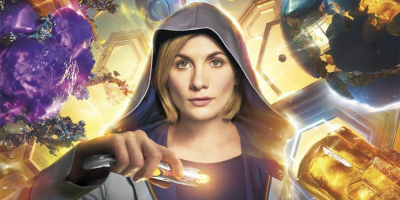
After
the underwhelming and lacklustre nature of season eleven of Doctor Who,
it was hoped that some very big changes would be made for series
twelve. The showrunner and lead writer Chris Chibnall has said more
than once that he doesn't read any reviews or articles about the show
and prefers to write Doctor Who in isolation inside his own little
bubble. That's fair enough because he has to do his own thing and you'd
hardly expect him to spend his evenings on Gallifrey Base reading
endless complaints about his version of the show. I'm sure he has far
better things to do with his time. However, he could hardly have failed
to notice the considerable slide in viewing figures throughout series
eleven. In Britain, 10.6 million people watched The Woman Who Fell to
Earth. By the time of the tedious finale The Battle of Ranskoor Av
Kolos, the viewing figures were 6.6 million.This
trend would get worse in series twelve. The series twelve finale The
Timeless Children drew only 4.6 million viewers - the worst figures
since the show came back in 2005. Clearly, for whatever reason, Chris
Chibnall's version of Doctor Who has not connected with a casual
audience in the way that Chibnall and the BBC might have hoped. Yes,
there are some possible mitigating circumstances - like the advent of
YouTube, streaming, catch-up, and people simply not watching
traditional 'live' television in the same way that they used to.
Technology is rapidly changing the way that we consume television or
entertain ourselves. However, series twelve was broadcast in the winter
during a number of wild storms in Britain when there wasn't much else
to do but batten down the hatches, stay inside, and watch television!
One would think this would be the ideal circumstances for high viewing
figures. This wasn't like a Capaldi season thrown to the wolves in
summer (when people go out a lot more) and up against big live sporting
events. The shows placed around
Doctor Who season twelve on the BBC's Sunday night schedule, like
Country File and Call the Midwife, actually beat Doctor Who in the
ratings. Embarrassingly, it was even speculated that Doctor Who's
dismal viewing figures were artificially inflated by impatient Call the
Midwife fans tuning in at the end to see if Doctor Who had ended yet! I
am really not a fan of Doctor Who being broadcast on Sunday nights.
Sunday is a night when kids are doing homework and there are less
likely to be more catch-ups on a Monday than Sunday. Doctor Who doesn't
feel like a Sunday evening show. It feels like a loss of prestige to
move from Saturday. Sunday evening and New Year's Day don't feel right.
Doctor Who should always be Saturday and Christmas Day. It's
hard not to think that a lot of the damage for this slide in ratings
was done in series eleven. Viewers were understandably curious to see
the first female Doctor at the start of series eleven but once this
curiosity had been sated they found a show hardly worthy of their time
(especially in an era when there are so many new sci-fi and fantasy
shows jostling for our attention). Series eleven was flat and dull. The
main cast (with the exception of the venerable Bradley Walsh) all
seemed out of their depth. They had no charisma or chemistry with one
another. The foundations of any good TV show are casting and the
characters. Chris Chibnall miscast three of the new TARDIS team (Jodi
Whittaker, Mandip Gill, and Tosin Cole, with respect, are not what you
would describe as talented or charismatic actors - at least not on the
evidence of their work in Doctor Who) and his scripts made the Doctor,
Yaz, and Ryan instantly forgettable into the bargain. Series
eleven made a mildly interesting if patchy start but then sank without
trace after the abysmal one-two punch of Arachnids in the UK and The
Tsuranga Conundrum (surely two of the worst episodes of Doctor Who ever
made). While series eleven never quite got this bad again it wasn't
much good either. Episodes like Demons of the Punjab, Kerblam!,and The
Witchfinders were just bland and forgettable. They never really grabbed
your attention or contained anything that would make you want to
return. By the time of the abysmal Battle of Ranskoor Av Kolos, no one
really cared anymore. Chris Chiball had somehow squandered all the
goodwill and curiosity that greeted the arrival of series eleven.Hopes
and expect ions were so high when The Woman Who Fell To Earth neared
its premiere and it was deflating and depressing indeed that series
eleven proved to be so tepid and disappointing. It
is obvious that the only way to reactivate interest in Doctor Who is
another fresh start. The show receives a curiosity spike from a new
Doctor. Chris Chibnall and Jodi Whittaker got that curiosity spike with
The Woman Who Fell to Earth but they gradually lost it by producing a
mediocre show that wasn't compelling enough to maintain its audience.
There are lifelong Doctor Who fans who bailed out during season eleven
let alone casual viewers! I do really not blame anyone who lost
interest in Doctor Who during series eleven. Like many Doctor Who fans,
I was dismayed and shocked at how bad series eleven was when it finally
hit the screen. Moffat and Davies might have stretched our patience at
times and dropped the odd duff episode but they never served up
constant unrelenting mediocrity in the way that series eleven did. Even
their worst scripts were festooned with more wit, imagination, and
subtlety than anything to drop from the pen of Chris Chibnall in series
eleven.Anyway, what about series
twelve? Was it better? Did Chris Chibnall learn any lessons? Well, yes
and no, but often yes. Although Chris Chibnall asserts that he avoids
reading anything about Doctor Who, series twelve definitely feels like
a reaction to series eleven. It almost feels like Chibnall studied the
most salient criticisms of series eleven and made some changes. Series
twelve is better than series eleven. There are a couple of two-parters,
the return of the 'cold open', returning villains, returning
characters, and an arc. You even get a big two part finale. Of the ten
episodes in series twelve, four are good, two are passable enough, and
four are duds. That's patchy but still a considerable improvement over
series eleven where - The Woman Who Fell to Earth aside - all of the
episodes were either boring or atrocious. The
best thing about series twelve is that stuff happens. It sounds obvious
and stupid I know but it's true. Stuff HAPPENS. In series eleven
nothing happened. There is more stuff to react to in Spyfall or
Fugitive of the Judoon than the whole of series eleven put together.
The return of an arc is welcome too. You might not like where Chibnall
ultimately goes with this arc but at least there is one. We have a
reason to keep watching. The writing got a mild shake-up too with Nina
Metivier, Maxine Alderton and Charlene James all becoming contributors.
Maxine Alderton in particular was a welcome addition. Even
the TARDIS interior (which was hideous in series eleven) looks better
in series twelve. The vast checklist of things in series eleven that we
complained about (like the lack of an arc, no high stakes, dull
stand-alone episodes, no returning villains or characters) has been
noted. An effort has been made to make the show better and more
compelling with bigger stakes and a sense of danger for the characters.
There are plenty of big guest stars like Stephen and Fry and Goran
Višnjić and a couple of surprise ones too. Series twelve is not a home
run but you can see that everyone tried to raise their game and make it
better. There is a lot of effort on show here - especially in the
two-part Bond themed Spyfall openers. These episodes feel more like a
big finale than a premiere and that's exactly what Chris Chibnall's Who
needed. We appreciate the effort. Series twelve is inconsistent but it
is much better than season eleven. What
about the clunky social messages of Chris Chibnall's Who? Has the
obvious politics been toned down? To a degree although it is surely not
a coincidence that the three episodes in series twelve that are
preaching to us in the most obvious way (Orphan 55, Praxeus, and Can
You Hear Me?) have the lowest audience ratings when it comes to AI.
Chris Chibnall apparently hasn't quite deduced yet that people do not
tune into Doctor Who to get a patronising lecture about microplastics
or the importance of mental health. They already know about these
things themselves thank you very much. Put the message in the subtext
of a good science fiction story. There it will resonate. Do not
broadcast the message with a loudspeaker in a story that is bland and
forgettable. People will take more notice of a message in something
they liked. If they get a clunky message in something they didn't like
they are simply going to be annoyed and feel like they are being
patronised by people who have made them sit through something awful. What
about the cast in series twelve? Are they any better? It's somewhat
more difficult to be positive in this area. Jodi Whittaker does seem to
improve in the Spyfall openers. For the first time we see her Doctor
angry, morose, sad, and distant. We see, for the first time, a real
sense of an inner life. But then for large tracts of series twelve the
Doctor is back to her usual bouncy, lightweight, and, well, annoying
self. You always get a sense that Jodi could have made a better fist of
this character with better writing but was rather hamstrung by Chris
Chibnall. Chibnall, for reasons best known to himself, has made the
first female Doctor weak and lightweight. When
one looks at Doctor Who post 2005 you can't imagine anyone else who
would have been as popular as David Tennant. That was clearly genius
casting. You can't imagine anyone who would have been as good as Peter
Capaldi was in the part. Capaldi might not have been a hit with casual
audiences in the way that Tennant was but it was great casting all the
same. Matt Smith and Christopher Eccleston were probably not quite
everyone's cup of tea but they were strong lead actors for the show.
Smith dominated the screen with his energy and eccentricity and
Eccleston was brilliant in dramatic scenes. Jodi Whittaker, in
comparison, feels like the first time the part has been miscast since
the show returned. Jodi doesn't really bring anything of her own to the
part (unless of course you count appearing to be out of breath all the
time as she grapples with dialogue). You can't help thinking that there
are many actors, of any gender, who would make a better Doctor than
Jodi. As for the
'fam', Ryan and Yaz still fail to make much of an impression. These are
surely two of the most forgettable companions in the long history of
Doctor Who. Series eleven was interesting in the way that it was a
reboot but one with no teeth. The show changed a lot. We had a new
female Doctor, a bigger TARDIS team, an eschewing of the history of
Doctor Who and the angry lonely God angst of the character. Chibnall
avoided classic villains and made the Doctor feel much more, well,
human. Chibnall seemed to want to make the show more simplistic. The
Doctor was more friendly and not weighed down by emotional baggage and
the stories had a more educational feel. The pacing was more sedate and
the new music felt more in the background than the (occasionally
bombastic) scores by Murray Gold. None of these things were bad ideas.
You might even say that some of them were interesting and
understandable decisions. The
problem is though that none of these decisions payed off in the end.
Jodi's less complex 'nice' new Doctor was bland and boring. The
'educational' stories were shallow and patronising. The TARDIS was too
crowded. The new villains were pathetic. The new music was pleasant but
forgettable. It was a tame and strangely half-hearted reboot. There
were no stakes to anything. Nothing happened! It was all too slow, too
talky, and too safe. And worst of all, it was smug. It was very pleased
with itself. One thing you can't accuse series twelve of being is tame.
Chris Chibnall is not tiptoeing around the Doctor Who sandbox in series
twelve. He's right there in the sandbox covered in sand and smashing
all the toys up. The end result is a season of Doctor Who that is much
more watchable than series eleven. It's not perfect and we get some
unwelcome series eleven flashbacks in its worst moments, but series
twelve is often entertaining in a way that series eleven never was. Anyway,
let's examine the Bond influenced two part Spyfall opening. I think the
first of these episodes is the best of the Chibnall Who era. I know
that's not exactly a high bar but this is a fun episode all the same.
Part two of Spyfall is decent enough too. Spyfall Part 1 was directed
by Jamie Magnus Stone and directed by Chibnall. The Doctor, Yaz,
Graham, and Ryan are called into MI6 by C (Stephen Fry) to investigate
some mysterious deaths. Their only lead is Daniel Barton (Lenny Henry),
the CEO of a media company. The Doctor contacts Agent O (Sacha Dhawan),
who was tasked with monitoring extra-terrestrial activities. C is
killed by aliens, but the Doctor and her companions escape. These pesky
dimensional aliens are mysterious indeed and what exactly is Daniel
Barton up to?Happily,
Spyfall Part 1 is a vast improvement on the dreck we were served up in
series eleven. It seems that Chris Chibnall has taken stock and changed
course. If series eleven was all about distancing itself from the
classic monsters and villains of Doctor Who to create its own identity
(an experiment which clearly failed), then series twelve feels a lot
like Chibnall trying to throw some fan service our way to get the show
back on track. Series eleven felt a lot like a show that wanted to
reach out to people who wouldn't usually watch Doctor Who. It was like
a soft reboot that eschewed the lore of the show. You didn't need to
know anything about Gallifrey or Time Lords or River Song or Cybermen
to watch series eleven. People flocked to the show in their droves to
experience the all new Doctor Who. The viewing figures were incredible.
But then, once they realised that the 'all new' Doctor Who was
absolutely tedious, they deserted the show in their millions - leaving
just the die-hards and people who had tuned in at the end to wait for
Call the Midwife. Anyway, Spyfall is the best episode of Chris
Chibnall's Doctor Who by some distance. It's actually really good. What
are the ingredients that make Spyfall so much better than anything in
series eleven? Well, for one thing it's well directed and shot. Even
the TARDIS interior looks much better than it did in series eleven.
They've improved the lighting, the console, and added some stairs. We
at least get a sense now that the control room is merely the entrance
to a much larger ship. The TARDIS interior was preposterously cramped
and cheap looking in series eleven but it looks much better in this
season. The moment where Sacha Dhawan's Agent O is given a look 'inside
the box' is fantastic. His geeky enthusiasm is very touching and they
deploy a nice trick where they sort of shoot the TARDIS interior from a
distance to give it a bigger sense of scope. Segun Akinola's music here
is appropriately magical and his Bond riffs throughout the episode are
nicely done too. There's definitely a bit of magic in Spyfall Part 1 at
times. The only time we experienced this in series eleven was when the
TARDIS reappeared at the end of The Ghost Monument. 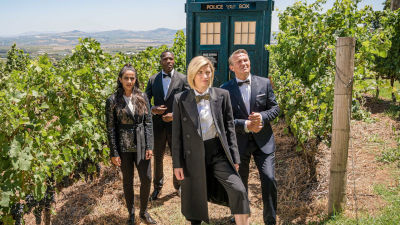
Generally,
Spyfall Part 1 is very enjoyable because it gives you all the stuff you
wanted in series eleven but didn't get. There's the start of an arc
here, a massive twist, a returning classic villain, plenty of action,
and decent aliens foes (a race known as the Kasaavin). The dimensional
aliens who feature in this episode are genuinely unsettling because
they are so strange and unfathomable. There are some good tense
sequences too like the scenes where the aliens take out the agents in
Australia. The scene where the aliens briefly seem to have infiltrated
the TARDIS is great too. At long last we feel a sense of genuine danger
for the characters in Chibnall's Who. This was desperately missing in
series eleven. During the RTD and Moffatt era you always got a sense
that the Doctor was a dangerous person to go on a journey with. Sure it
was fun and mostly ok to travel with the Doctor, but you never quite
knew what was around the corner. You could easily end up as a converted
Cyberman or trapped in another dimension. That quality was lost in the
Chibnall era but it returns here because the alien foes seem formidable
and dangerous. There's a
nice sense of scope in this episode too that works well. Chibnall's Who
will try and deploy this 'globetrotting' style again in series twelve
later on to less impressive effect but here it is executed with great
style. The supporting cast in this episode is very good. Stephen Fry
has a brief but enjoyable cameo as the head of MI6 and Lenny Henry is
effective enough as the mysterious tech genius Daniel Barton. The real
star though is Sacha Dhawan. The big reveal at the end of this episode
is that Agent O is really the Master and the reveal is quite, well,
masterful. "I did tell you to look out for the spymaster. Or should
that be spy... MASTER." The flip that Dhawan does from the nerdy and
kind Agent O to a thoroughly evil and oleaginous Master is absolutely
wonderful. Dhawan does not hold back or give us a subtle Master. He is
completely bonkers and over the top. And you know what? I love it. This
is exactly what Chris Chibnall's Doctor Who neeeded. Some energy and
over the top charisma. Mad twists. Old villains. We just sat through an
entire season of Doctor Who where literally NOTHING happened and it
feels like Spyfall is a (very welcome) reaction to that. You
have to love the fact that The Master has his Tissue Compression
Eliminator and kept the real Agent O in a matchbox! Some fans felt that
it was a little too soon to bring the Master after Missy played such a
big part in the last Capaldi season. We knew though that the Master
would eventually come back to Doctor Who though didn't we? Why wait? I
think Chibnall was right to go for broke and throw the Master straight
back into the fray. It's what the show needed. You never really get an
explanation for where this Master comes from in the line of Masters but
it doesn't really matter in the end. The Master is back and he's as mad
as a hatter. Do you really need much more than that? Sacha Dhawan's
energy and exuberance at the end of this episode is very enjoyable. This
is definitely the best of the Chris Chibnall scripts so far on Doctor
Who and there are even some sly jokes. Stephen Fry's C assumes that
Graham is the Doctor at first and he won't be the last person in series
twelve to make this mistake. This even led to a conspiracy theory that
Graham was really a Doctor who had lost his memory! I personally like
to think that Chris Chibnall having people constantly mistake Graham
for the Doctor in series twelve was a meta response to smart alecs like
me who watched series eleven and said Graham felt more like the Doctor
than Jodi! What of Jodi and the
fam in Spyfall? Well, Ryan and Yaz get a bit more to do here when they
have a separate mission to interview Daniel Barton. These characters
seem a little bit better in this episode than they were in season
eleven and enjoy few nice comic moments. Bradley Walsh is still
enjoyable enough as Graham - offering a very human counterpoint to all
the derring do and escapism. You get the feeling that Graham would
prefer a comfy chair and a cup of tea to battling aliens. Graham is a
good way to amusingly deflate the escapism with his down to earth
nature. Series eleven was so dull that Graham had precious little
escapism to play off but he works very well in the first of these
Spyfall episodes that begin series twelve. As
for Jodi, well, there is no obvious quantum leap here in terms of her
Doctor. She's still a middling actor who feels somewhat miscast and out
of her depth. Jodi Whittaker, with respect, simply doesn't have the
acting chops and natural charisma to carry this show in the way that
actors like David Tennant and Matt Smith could. It's the reason why the
really awful episodes in the Chibnall era feel all the more awful. If
Steven Moffat produced a substandard story he at least had the saving
grace of a Peter Capaldi or Matt Smith to mask some of the flaws in the
writing with a commanding and charismatic lead performance. Jodi
Whittaker, in contrast, simply sinks with the material. What
is nice though is the evening dress suit that Jodi wears with the
bow-tie to infiltrate the big swanky casino function. A riff on the
casino sequences in Bond films. It's amazing how a more Doctor-like
costume makes Jodi seem so much more like the Doctor. I still think her
costume should have been the dark 'hoodie' she wore in the short film
they made to announce her as the Doctor. The 'snap' scene though when
the Doctor gambles in the casino does rather illustrate Chris
Chibnall's tin ear for humour. It is one of the big weaknesses of this
showrunner. Russell T Davies and Moffat could make their Doctor Who
scripts funny because they are naturally witty men. Chibnall struggles
with this aspect of Doctor Who and it really shows. Yes,
the motorcycle sequence is a bit too cartoonish and silly for its own
good but we forgive Spyfall a few contrivances. Spyfall is a sort of
Bond homage so the action sequence and casino scene is part of that I
suppose. What's great about Spyfall Part 1 is that it feels like they
really pushed the boat out. The money is there on the screen with the
locations and special effects. The big plane sequence at the end is
terrific and very tense. It's fantastic to see the Doctor and these
companions in real danger - something that was completely missing from
series eleven. The Doctor is zapped out of the plane to who knows where
- leaving Ryan, Yaz, and Graham trapped on an aircraft about to blow
up. The Master, before he escapes, teases the Doctor with the cryptic
line - "Everything that you think you know... is a lie." This is great
because it's a hook to make us keep watching. It's a cliffhanger.
Spyfall Part 1 is exactly what we wanted when we tuned into the start
of series eleven but didn't get. It's fast, well made, has an
interesting story, some good horror sequences, plenty of sci-fi, and
rattles along in entertaining fashion. You
might reasonably ask where the Chris Chibnall who wrote and produced
Spyfall was in series eleven. Spyfall is exactly what the first episode
of series eleven needed to be like. If they'd come racing out of the
gate this strongly in series eleven I think they might well have
managed to hold onto more of the incredible audience who tuned in out
of curiosity to watch Jodi's debut. I suspect that casual viewers were
somewhat underwhelmed by The Woman who Fell to Earth and then simply
bored by The Ghost Monument. One can easily see how casual audiences
might have rapidly bailed out episode to episode. The double whammy of
awfulness and tedium that arrived with Arachnids in the UK and The
Tsuranga Conundrum must have been the final straw for many.Spyfall,
by contrast, shows us that Chris Chibnall at the top of his game is
perfectly capable of writing good Doctor Who episodes and, happily, the
direction and supporting cast are well up to speed too. All of the cast
members get something to do, the story is mysterious in a way that
provokes curiosity in the viewer, there are some good sci-fi horror
elements, and it all builds to the fantastic twist. You have to love
the Master's flying Australian bush house TARDIS at the end (a rather
nice riff on The Wizard of Oz). That's a great moment when they all
look out of the window and are utterly baffled. One thing we have to
give Chris Chibnall credit for too is that he is a lot better at
keeping secrets than Steven Moffat was. You can't imagine that the
return of John Simm as the Master in the Capaldi era would have been
completely spoiled in advance if Chibnall had been in charge. Spyfall
Part 1 is a lot of fun and surprisingly good. Spyfall
Part 2 was directed by Lee Haven Jones and written by Chibnall. The
Doctor is zapped into a strange dimension where she mets Ada Lovelace
(Sylvie Briggs) and they are transported to 1834. The Doctor and Ada
end up in Paris during World War 2 but are rescued by Noor Inayat Khan
(Aurora Marion). The Master tracks her down and tells her that
Gallifrey has been destroyed. The Doctor must somehow find a way to
foil the masterplan that the Master, Barton, and the Kasaavin are
somehow involved in...Spyfall
Part 2 is wonky in places and doesn't feel as fresh as the opener of
series twelve but it just about sticks the landing. It's a decent
enough way to end the welcome return of the Doctor Who two-parter.
Chibnall's habit of dumping too much exposition on the characters (not
to mention the audience) is in evidence but, despite its flaws, Spyfall
Part 2 is still a whole lot better than the stories we were forced to
sit through in series eleven. You might say that the historical figures
Ada Lovelace (a pioneer in early computers) and Noor Inayat Khan (a
spy) are shoehorned into this episode but I confess I didn't know much
about these real life people and so it was interesting to see them in
Doctor Who and learn more about who they were afterwards. One thing we
should mention, and it's one of the reasons why these Spyfall openers
work, is that Chibnall is not virtue signalling himself to death in
these two episodes. We are not being spoon fed some preachy social
message. We are, to our shock, actually having some fun! Spyfall Part 2
probably takes a little too long to get going but it has some lovely
scenes and also gives Jodi's Doctor a few overdue and welcome moments
of introspection and sadness.The
plane sequence cliffhanger is pretty good at the start of this episode.
The Doctor has left a video message with instructions on how Graham,
Ryan, and Yaz can survive. This scene is quite amusing. One thing that
is welcome in Spyfall Part 2 is the way that the Doctor is separated
from the companions. This is something that was much needed. Jodi
needed more of a solo spotlight to cement her Doctor and she gets that
here. At long last in this episode Jodi is starting to feel a little
more like the Doctor. What helps of course is the fact that she has
Sacha Dhawan to play against. Their scenes in Paris especially are very
good. The Master tells the Doctor that Gallifrey was destroyed when
they meet in the war torn city. The Doctor doesn't believe him but when
she returns there at the end of the episode she finds only flaming
ruins. She is distraught. At last we have some angst from this Doctor.
It's one of the best moments for Jodi. There's
a nice scene too where The Master sends a message to the TARDIS and we
see a hologram of him mocking the Doctor. He tells her that she is not
who she thinks she is and that he destroyed Gallifrey in revenge for
the lies they had been told. First things first. The TARDIS interior
really does look much better in series twelve. They have clearly gone
to the time and trouble of improving this set. You might argue that
it's a bit soon to go back to Gallifrey (Hell Bent really doesn't seem
that many episodes ago does it?) but, at this stage, we'll take it.
We'll take Gallifrey over flying tea towels and The (Non) Battle of
Ranskoor Av Kolos. It looks as if the 'Timeless Child' reference, which
Chibnall floated a few times in series eleven, will play a big part in
series twelve. 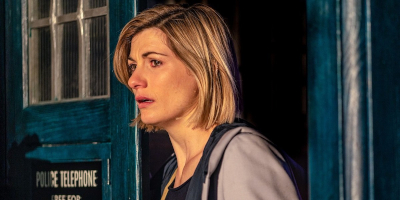
Sacha
Dhawan hams it up somewhat when the Master appears in 1834, shrinking
people left, right, and centre, but, as we noted in part one of
Spyfall, Chibnall's Who was so lacklustre and dull in series eleven
that we desperately needed something like this. Chibnall had to go for
broke at the start of series twelve to get us interested again and he
does. This show needed the injection of energy that Sacha Dhawan
supplies. Jodi is better in these Spyfall episodes but there are still
some problems. We've probably accepted by now that's she never going to
be great in this part. Notice the line where the Doctor says to the
Master "What do you want?" after he's been manically shrinking people.
Capaldi would have given this line so much subtext. So much weariness
and defiance. Jodi literally just says the line as if she's reading it
off her hand. What
doesn't work quite so well in this second part of Spyfall is Graham,
Ryan, and Yaz. They go on the run from Barton and Chris Chibnall
clearly struggles to find something for them to do. They have a nice
scene where they hide out on a building site and Graham tries to rally
them but their antics on the run soon become tiresome. The sequence
where Graham dons 'laser shoes' is rather embarrassing and silly.
There's so much stuff going on in these Spyfall episodes with the
Doctor and the Master so maybe it was just unavoidable that there
wouldn't be much room for the companions to thrive.Lenny
Henry's Barton makes a serviceable villain in the end but he does get a
little lost as a character because there are so many other villains in
this story. This is really a showcase for Sacha Dhawan and although the
Doctor zaps him to the alien dimension at the end we are fairly sure
that we'll be seeing him again soon enough. There is no real
explanation for which incarnation of The Master this is (in relation to
Missy) but it doesn't really matter. We can simply speculate for
ourselves. Villains in Doctor Who never really die. They can always
return one day. What's nice about this version of The Master is that
he's genuinely nasty and unhinged. The design of the scenes of the
Doctor and the Master in war torn Paris are very well done with planes
flying overhead and smoke billowing in the rubble. Another
overdue moment comes in this episode when the companions ask the Doctor
about who she really is. Their apparent lack of curiosity in the Doctor
always felt strange so this is an interesting moment. The Doctor looks
pained though when Yaz asks if they can visit Gallifrey (which, of
course, has just been destroyed). This is another good moment for Jodi.
At last we have seen her Doctor display an inner life and a sense of a
long and sometimes sad past. One
other nice scene in Spyfall Part 2 comes when the Doctor must
'retrospectively' save Graham, Ryan, and Yaz on the plane at the end of
the episode. She had completely forgotten about this so must come up
with a plan - which we see her completing through a montage (a bit like
the sequence where she made a sonic from spoons in The Woman who Fell
to Earth). This is good fun. When the Doctor wipes the memories of her
historical companions so they don't have knowledge of the future, this
is quite touching. The Doctor tells Ada that she doesn't need to know
about the future. She'll work it out for herself. The human race will
get there in the end. Chris Chibnall can often be hollow and
pretentious when he tries to inject some heart into Doctor Who. One of
his big weaknesses is to lean back into turgid 'straight' drama of the
type that you might find in some ITV drama. In Spyfall Part 2 though he
manages to inject some heart into the story without it feeling clunky
or undeserved. The
scene in the TARDIS with the holographic Master is great because, in
contrast to series eleven, the TARDIS now becomes almost like an extra
character again just like it was in the RTD and Moffat years. Notice
how the TARDIS interior seems to have turned blue to reflect the
Doctor's mood. We get a lot more scenes in series twelve of the Doctor
in the TARDIS and not only does this give the season more 'Who residue'
than series eleven had, you can see that they did this because they
have much more confidence in the TARDIS interior now. They've made it
bigger, they light it much better, and it just looks more impressive.
Happily, this means that Jodi can be seen in the TARDIS much more in
series twelve and the TARDIS interior no longer seems so plastic, fake,
and cramped. My own personal nitpick is that the console should still
be bigger but I am happy to admit that they've improved the TARDIS
interior considerably in series twelve. Spyfall
Part 2 takes a bit too long to get going at times and the escapades of
Graham, Ryan, and Yaz on the run wear a bit thin in the end but -
generally - this is a pretty solid end to the Spyfall run. While most
of Chris Chibnall's Doctor Who has left me cold and frustrated, these
Spyfall episodes are generally a lot of fun. - Jake
Buy No Time to Die - The Unofficial Companion.
© 2021
Alternative 007
|

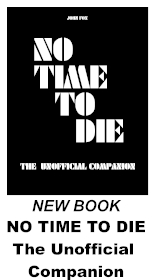
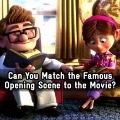
|






